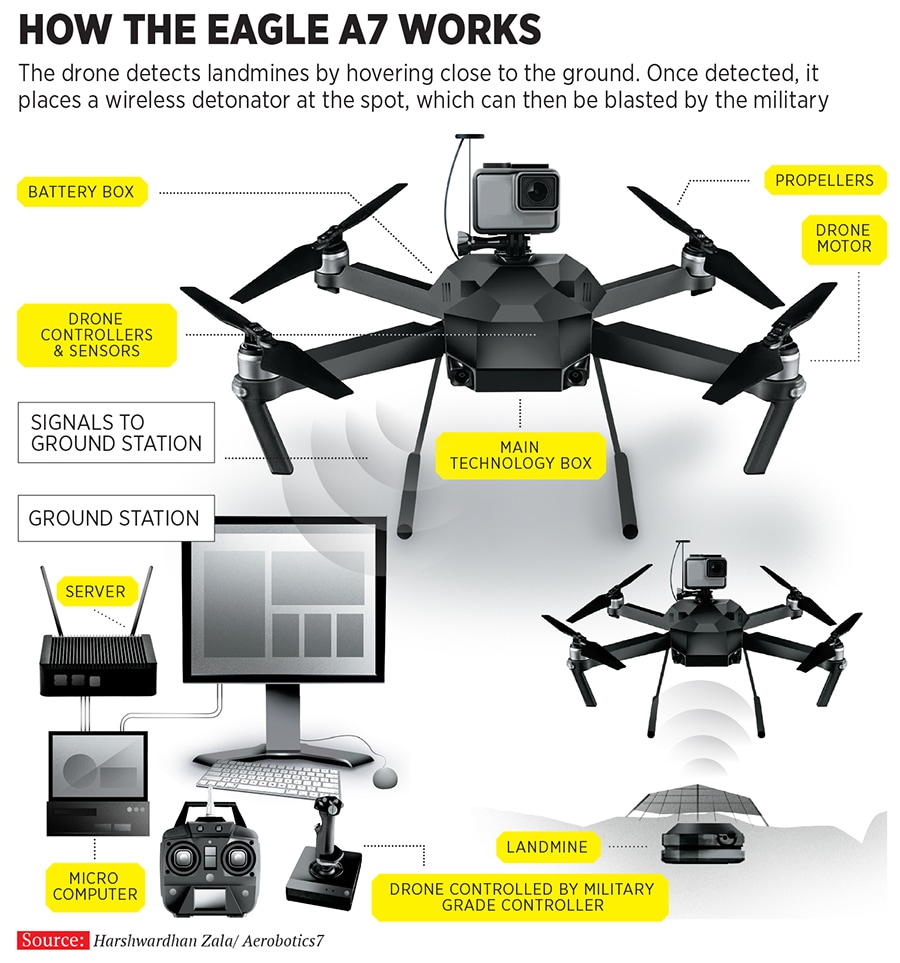Harshwardhansinh Zala: Drone maker at 15
The teenager has developed a drone that detects and detonates landmines. His EAGLE A7 is among the many Indian innovations grabbing global attention


Harshwardhansinh Zala has been tinkering with robotics since the age 10
Image: Sumit Baruh for Forbes India
Harshwardhansinh Zala looks like any other teenager with his skinny frame, side-parted hair and rectangular eyeglasses. However, what sets the 15-year-old tech freak apart is his latest innovation: A drone that can detect and detonate landmines. “We’ve developed a technology called multi-spectral detection to identify metal and plastic landmines, unexploded ordnance and improvised explosive devices. We can detect explosive devices, track their location and detonate them with our wireless detonator, averting any human risk,” says the inventor from Ahmedabad, animatedly with a furrow on his forehead.
Developed over three years, EAGLE A7 (Escort for Attacking on Ground & buried Landmines as Enemy by Aerobotics7) is a battery-operated, 555-mm wide quadcopter drone. It has an accuracy rate of 91-93 percent, claims Zala. Built using a 3D printer, the device can detect landmine explosives and send real-time data to a ground control station (see graphic). The drone is also equipped with a light-weight wireless detonator (developed in-house) to blast the landmine. Zala is working on filing five international patents for his technology.Coming up with solutions for common problems is a habit for Zala, who has been tinkering with robotics since the age of 10. “My first project was to devise a TV-remote-controlled home automation system to control electrical appliances like fans and lights,” he tells Forbes India. However, access to scientific information was a challenge for the youngster, who used to drag his grandfather along to an internet cafe, for online research that would go on till midnight. In fact, the inspiration to invent his drone came from a YouTube video of soldiers being blown up by landmines.
According to the international non-profit CARE, around 26,000 people, globally, fall prey to landmines every year.
His invention has opened up new avenues for Zala. Visits to Silicon Valley (including one to Google), invitations to tech events such as the Maker Faire Bay Area and offers of admission from multiple foreign universities are frequent. He aspires to study at an institute like the Massachusetts Institute of Technology or Stanford University. Presently, though, Zala has taken a break after his class X exam to focus on his drone-making startup, Aerobotics7 Tech Solutions.
As a schoolboy, Zala supplemented his income by guiding engineering students on their academic courses and projects. Aerobotics7’s staff includes 20-30 of his protégés as volunteers and three full-time employees. His father Pradhyumansinh, who served as an accountant in a plastics company, heads the company’s finance department.
To build Aerobotics7, the science prodigy started out with a loan from his parents and some financial support from the Gujarat government and a few investors. It has largely been funded and sustained through Zala’s own earnings from teaching and supplying devices and consumer products like smart home appliances and Wi-Fi-controlled door locks. The venture’s research and development cost is about ₹15-16 lakh per project, says Zala.
The commercial feasibility and full-scale production of EAGLE A7 is still a long time away, but the prototype has already created a buzz, eliciting interest from Indian and South Korean armies as well as from some foreign governments.
Prime Minister Narendra Modi and his Israeli counterpart Benjamin Netanyahu pre-launched the drone earlier this year at Ahmedabad’s International Centre for Technology and Entrepreneurship event.
At the Vibrant Gujarat Global Summit last year, Zala signed a ₹5 crore memorandum of understanding with the department of science and technology, government of Gujarat, to facilitate the production of his drones.
“Apart from [monetary and marketing] support, guidance is also being given. He will later be taken to one of the incubators, and depending on how he proceeds, [to] angel investors as well,” says Gujarat Chief Secretary JN Singh, who is impressed by Zala’s “spark and enthusiasm”.
Zala developed the mock, non-explosive landmines for trials in his hometown, based on data available from the United Nations.
However, his real test will come when the final prototype is presented to the Indian Army in about six months from now.
Zala, however, is unfazed and says he is determined to develop this product for a safer world, irrespective of the time it takes. “Never underestimate yourself,” he adds. “If you want to change something, do it even if it is impossible for the world. It requires passion, hard work, and of course, talent. By combining all of these, we can succeed, and prove that young people can also make a huge difference.”
First Published: Apr 27, 2018, 11:57
Subscribe Now